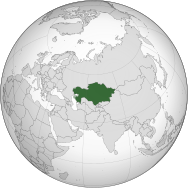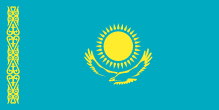

The following outline is provided as an overview of and topical guide to Kazakhstan:
The Republic of Kazakhstan is a landlocked sovereign country located across both Central Asia and Eastern Europe.[1] Ranked as the ninth largest country in the world as well as the world's largest landlocked country,[2] it has a territory of 2,727,300 km2 (greater than Western Europe). It is bordered by Russia, Kyrgyzstan, Turkmenistan, Uzbekistan and China. The country also borders on a significant part of the Caspian Sea.
Vast in size, the land in Kazakhstan is very diverse in types of terrain: flatlands, steppes, taigas, rock-canyons, hills, deltas, mountains, snow-capped mountains, and deserts. Kazakhstan has the 62nd largest population in the world, with a population density of less than 6 people per square kilometre (15 per sq. mi.).
Kazakhstan declared itself an independent country on December 16, 1991, the last Soviet republic to do so. Its communist-era leader, Nursultan Nazarbayev, became the country's new president. Since independence, Kazakhstan has pursued a balanced foreign policy and worked to develop its economy, especially its hydrocarbon industry. While the country's economic outlook is improving, President Nazarbayev maintains strict control over the country's politics. Several opposition leaders and journalists have been killed in recent years, and Western observers generally do not consider Kazakhstan's elections to be free and fair. Nevertheless, Kazakhstan's international prestige is building.[3] It is now considered to be the dominant state in Central Asia.[4] The country belongs to many international organizations, including the United Nations, NATO's Partnership for Peace, the Commonwealth of Independent States, and the Shanghai Cooperation Organisation. In 2010, Kazakhstan will chair the Organization for Security and Cooperation in Europe. In 2011, it formed a customs union with Russia and Belarus.
Kazakhstan is ethnically and culturally diverse, in part due to the mass deportations of many ethnic groups to the country during Stalin's rule. Kazakhs are the largest group, followed by Russians. Kazakhstan allows freedom of religion, and many different beliefs are represented in the country. Islam is the primary religion, followed by Orthodox Christianity. The official language is Kazakh, though Russian is still commonly and most widely used for everyday communication.
- ^ "Kazakhstan". The World Factbook. United States Central Intelligence Agency. July 2, 2009. Retrieved July 23, 2009.
- ^ Agency of Statistics of the Republic of Kazakhstan (ASRK). 2005. Main Demographic Indicators. Available at http://www.stat.kz Archived 2010-03-14 at the Wayback Machine
- ^ Zarakhovich, Yuri (September 27, 2006). "Kazakhstan Comes on Strong", Time Magazine.
- ^ Medvedev Visit Underscores Kazakh Victory Over Uzbekistan For Regional Dominance Archived 2008-05-28 at the Wayback Machine Radio Free Europe/Radio Liberty

